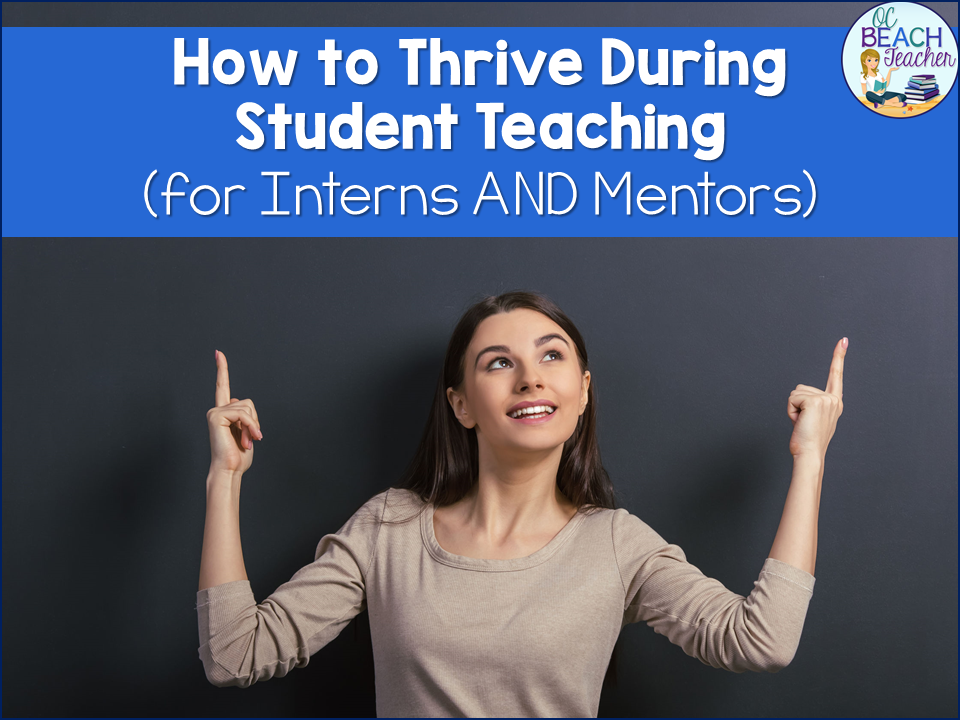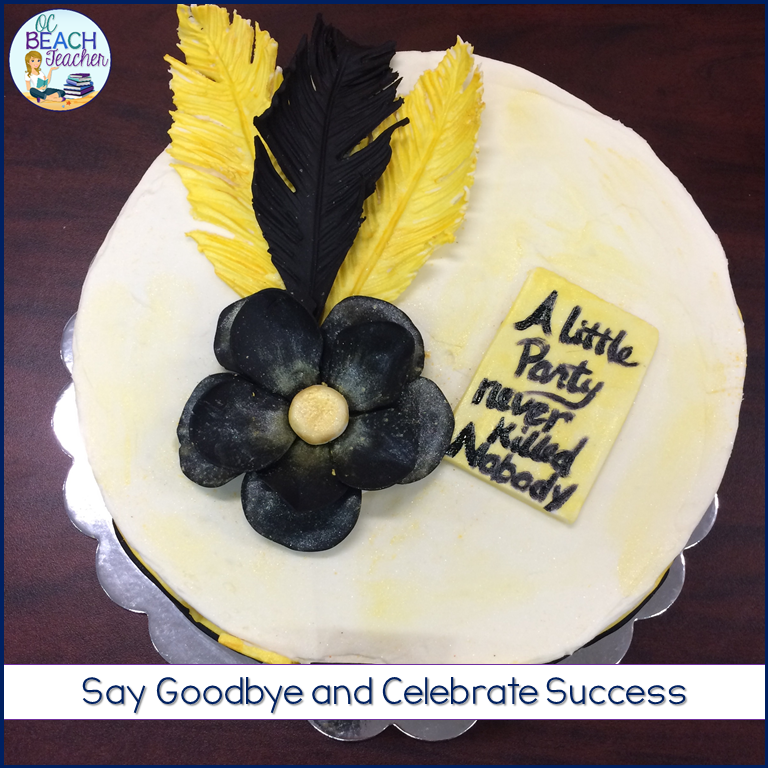Student Teaching…it’s an essential element of every college teaching program and an important experience for both the mentor teacher and the pre-service teacher!
For student teachers, it provides the opportunity to gain hands-on experience in the classroom and gain knowledge of the realities of the life of a classroom teacher. For mentor teachers, it provides opportunities to reflect on your teaching practice, grow professionally, and get trained assistance in your classes.
Have you been asked to mentor a student teacher?
Mentoring a student teacher is not always popular with experienced teachers. It involves some risk and the ability to relinquish control of your classroom. Despite those facts, I enjoy having student teachers and have mentored nine, including many who have gone on to become successful teachers.
I enjoy student teachers (also called teacher interns) because they bring enthusiasm, energy, and new ideas to my classroom and teaching. As students who have recently taken secondary ELA methods courses, they also are knowledgeable about new technologies, texts, and teaching strategies which help keep me current. Of course, being a cooperating teacher and student teacher isn’t always easy, so here are some tips from my experiences and training over the years.
For Cooperating Teachers (Mentors)
1. Remember, they are still students!
These days many of my student teachers (earning their bachelor’s degrees for secondary English) are closer in age to my high school students than to me, so this is quickly apparent.
This means mentors should scaffold and use gradual release models- just like with their adolescent students. This includes providing guidance with co-teaching and planning, adding ever-increasing tasks and responsibility as the student teacher progresses in their student teaching experience.
For instance, they will need to observe at first and may want to work with small groups of students before teaching a whole-class lesson. Then, they may want to do mini-lessons before doing a full lesson. Often, my interns watch me during the early classes in the day and gradually take on more of the teaching responsibilities as each day progresses.
2. Be sure to communicate often.
This can be challenging during a busy school day, but it is essential to success for you and the intern. I usually set aside at least 15 minutes of each planning period to talk with my interns. We may also schedule discussion times before and after school as needed.
Recently, I found it helpful to reiterate and review our conversations through email to make sure we both remembered what we talked about. It also gave use both time to reflect on earlier discussions and ask follow-up questions. Furthermore, it helped make expectations clear since they were in writing. Mostly, it’s important to have routine conversations in a way that work for you both.
Three-Column Feedback Approach
Communication also includes providing feedback. Of course, student teachers need praise and positive reinforcement to build their confidence, but they also need honest feedback, including constructive criticism. I like using an “I See,” “I Hear,” and “Questions” approach. (My own supervisors used this technique with me.)
I divide a page into three columns and observe the intern teaching, noticing details such as which students in the class participate in discussion and what those students are saying and doing. I also note the intern’s words and actions- movement around the classroom (use of proximity). I’m much like a human video camera (although actually videotaping the intern teaching is also a great idea – and usually required.) However, by personally observing, I can bring attention to things that an intern might not be aware of when watching a video.
3. Expect professionalism.
Student teachers often look young, especially if they’re working in a middle school or high school classroom. They’re probably accustomed to wearing jeans and casual clothing for their college classes, but they should wear professional attire appropriate to the school culture where you teach. This may include being even more formal than the seasoned teacher at your school. At the university where my interns attend, they even sponsor a “fashion show” for their methods students. At the very least, it may be worth a discussion between the student teacher and mentor.
Furthermore, use of cell phones should also be discussed. Unfortunately, I’ve had several student teachers who were on their phones while they were supposed to be observing our classes. In my school, students aren’t supposed to have their cell phones out in class and the intern should model appropriate behavior. This may be a new concept for your intern, however, so it may need to be explicitly stated.
4. Collaborate with them.
Take time to plan engaging lessons together! Use both of
your talents and skills to improve instruction in your classroom. This may involve taking turns for who leads lessons or works with small groups of students. I’ve gained wonderful ideas from my interns. One made an environmental connection to our Native American Myths with an excerpt from the book, No Impact Man, and I’ve expanded the lesson since then. Several have introduced me to new technologies including brainstorming tools. Another intern, dressed up with me when we hosted a Roaring 20’s Party after teaching The Great Gatsby.
5. Say Goodbye & Celebrate Success!
Plan some goodbye activities for the last week with your student teacher. The students may want to write notes or cards to her or him. The intern may need to do a survey and request feedback from the students.
You may even want to throw a small party or get a cake for
your student teacher. If possible, make the celebration fit with a current unit. I’ve ended with a To Kill a Mockingbird tea party and Great Gatsby celebration. You may also want to purchase a gift for your student teacher. Depending on the intern, I’ve given gifts including a t-shirt from our school store, a journal for reflective writing, books, and gift cards. And of course, be sure to offer to write a recommendation.
For the Intern
1. Show humility and appreciation.
When I was a student teacher, I thought I knew a lot more than I actually did. I had worked as an educational assistant before pursing my M.Ed., and obviously, I was up-to-date on the latest research from my methods classes.
While I found some of the lessons and procedures used from my cooperating teacher to be boring, I didn’t understand that she had many years of experience that lead to her routines and teaching style. I also didn’t know that she had to meet mandates from her own supervisors. It’s best to be humble during your experience and consider yourself a “house guest.” The mentor teacher has invited you into his or her classroom, and you should be as gracious as you would with any other person who is hosting you.
2. Listen, reflect, and ask questions.
Take time to listen and reflect on your days. Often, as you’re
reflecting on your daily experiences, you’ll realize that you have more questions for your mentor teacher. Jot these down so you won’t forget to ask them, or email the questions so your cooperating teacher has time to give you thoughtful responses. You may also want to keep a diary in which you note your thoughts each night. Or, if you’re like me, and find yourself too busy to write in a journal, you can simply write notes in your teaching plan book.
3. Be professional.
As mentioned above, your mentor teacher should expect professionalism from you, but you can make that easier by simply acting in a professional manner. That means that you should dress appropriately and refrain from interacting with students outside of the classroom unless it’s for a sanctioned extracurricular activity.
Be sure to set boundaries since students won’t always know how to handle a young teacher and may see you as a friend, (or even a love interest). Make it clear that you are not able to be friends while you’re interning. That includes making sure not to connect with them on social media. Unfortunately, I had a student teacher who was asked to leave our school when she went to a party with students (even though she had graduated from our school and knew some of them for a while). It’s best to err on the side of being more conservative while you’re a student teacher.
4. Observe many different teachers.
Given the opportunity, ask to observe as many different teachers as possible. This may mean watching teachers in different grade levels and/or content areas. You will notice that in each classroom, teachers will have unique procedures and ways of managing their classroom. By watching a variety of teachers, you will get the best ideas for your own style of teaching and future job. It also helps to see how students behave at different grade levels and with different teachers’ personalities.
5. Get involved and volunteer!
If you’re serious about getting a teaching job (maybe even at the schools where you intern), take time to assist out of the classroom. Administrators will truly be impressed with interns who attend sports or club functions. At our school, we’re always in need of adult chaperones for dances and nighttime activities during Homecoming or Prom spirit weeks. Not only will you have opportunities to network with staff members, but you’ll build better rapport with students and parents!
Although student teaching is challenging at times, it can be a wonderful experience that will lead to a fulfilling career. Hopefully, some of these tips will make the experience beneficial for both mentor teachers and their teacher interns.
What tips would you add? What experiences have you had with student teaching? Please add your thoughts below!






